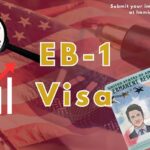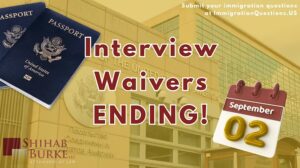Today we discuss the transition from F-1 (international student) to H-1B (specialty occupation worker) in 2025. This includes new cap-gap rules effective this year, recent updates on F-1 student visa revocations, and more! The attorneys will conduct a Q&A session afterwards.
How to reach us?
https://immigrationvisaattorney.com/contact-us or 614-791-0500
Want your immigration question answered in our next live stream?
Submit it now at ImmigrationQuestions.US, and you might be featured!
Table of Contents
Current State of Student Visas
- The issuance of student visas is currently undergoing significant scrutiny, with a worldwide halt on new applications as authorities revise their vetting processes.
- This situation is particularly pertinent regarding how applicants’ social media is evaluated during the visa application process.
- Student visas, particularly the F1 visa, are crucial for individuals seeking to study in the United States, especially for those without existing familial or employment ties to the country.
- The F1 visa allows individuals to enter the United States with the primary intent of pursuing education, which can lead to greater opportunities for establishing a life in the U.S.
- However, there is a clear expectation that students must maintain their intent to study and plan to return home after their education, as any deviation from this could lead to complications with their visa status.
- The U.S. State Department has announced plans to revoke visas for Chinese nationals linked to the Chinese Communist Party or involved in sensitive sectors, raising concerns about the implications for Chinese students in the U.S.
- Statistics indicate that there are approximately 277,000 Chinese students in the U.S., second only to India, which has around 330,000 students.
National Security Concerns and Visa Revocation
- Concerns over national security are influencing the U.S. government’s approach to student visas, particularly for those from China, where there is a fear of technology transfer to unfriendly nations.
- The discussion highlights the government’s potential reliance on AI to analyze student data, including their areas of study, to identify individuals who may pose security risks.
- The conversation underscores the complexities involved in vetting a large population of students, emphasizing the challenges faced by government agencies in effectively monitoring visa holders.
International Student Survival Guide: F-1 to H-1B
- The transition from F1 student status to H1B work visa status is fraught with potential pitfalls, and many applications are denied due to missteps during this process.
- One significant change to the cap gap policy allows students whose H1B petitions are filed before their F1 OPT or STEM OPT authorization expires to have their work authorization extended until April 1st of the next fiscal year.
- This extension reduces the urgency for students to file for premium processing, which can be costly and stressful for both students and employers.
- It is essential for students to maintain their visa status and to file for STEM OPT extensions whenever eligible, as H1B approval is never guaranteed until the visa is in hand.
- Students must also be aware of the unemployment limits during OPT and STEM OPT periods, with a total of 90 days of unemployment allowed during OPT and an additional 60 days during STEM OPT.
- Failure to adhere to these unemployment regulations can jeopardize a student’s ability to change their status from F1 to H1B.
Employment and Training Regulations
- During the OPT period, students are allowed to engage in unpaid training, but it must be structured to have an educational component to comply with Department of Labor regulations.
- The training must be documented appropriately, and students are advised to ensure their unpaid positions meet these educational criteria to avoid complications with their visa status.
- The need for careful documentation extends to Curricular Practical Training (CPT), where institutions are scrutinized for their practices regarding day one CPT, which has come under increased examination by immigration authorities.
- Students must ensure they are meeting all requirements and maintaining proper documentation to avoid issues with their visa applications.
Job Change and H1B Application Process
- Changes in employment during the H1B application process can significantly impact a student’s ability to secure their visa, particularly if they are selected in the lottery but then change jobs.
- Traveling outside the U.S. while an H1B change of status is pending can lead to the abandonment of that application, making it crucial for students to consult with their employers or legal counsel before making travel plans.
- There is a heightened level of scrutiny on visa applications, and students are advised to be cautious about any changes in employment or status during the application process.
Final Thoughts and Recommendations
- The current landscape for student visas is complex and evolving, with increased scrutiny and regulatory changes that require students to stay informed and proactive in managing their visa status.
- Students should seek legal counsel when navigating the intricacies of their visa applications and employment changes to ensure compliance with immigration laws and to protect their status.
- It is essential for students to document their employment history accurately and to be aware of the implications of unemployment during their OPT and STEM OPT periods.
- The importance of understanding the nuances of visa applications and the potential for national security concerns cannot be overstated, as these factors will likely continue to influence immigration policy in the future.









